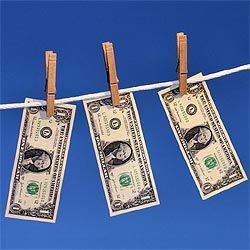What Tellers Aren’t Telling: How the US Bailout Supports Crime

Yet another reason why the TARP bailout packages failed the American public… Explained in a recent article I wrote for Scenario Magazine.
“Banksters, Enronites, Ponzi schemers, pin striped pimps! Public rage against bankers and the banking industry has never been stronger since the recent economic meltdown. Raping our IRAs, forcing us all into poverty, and foreclosing on the middle class seems to be the bankers’ business plan. People would really blow up if they realized that there is still another category of ongoing financial crimes that is flying completely under the radar. Just like all the others, this type of financial crime is firmly entrenched in the banking community and is part of the Business as Usual mentality. The forgotten outrage? Money Laundering.
Experts and congressional investigators estimate that US banks launder between $250 to $500 billion annually. In many cases, federal regulators look the other way while the dirty money is directly deposited into US accounts. In other cases, banks deal with overseas “correspondent” or “shell banks”, which allows drug cartels to transact with major US financial institutions without stepping foot in this country. A study by Binghamton Sociology Professor James Petras described how institutionalized money laundering has become:
U.S. banks have developed a highly elaborate set of policies for transferring illicit funds to the U.S., investing those funds in legitimate businesses or U.S. government bonds and legitimating them… the sum of dirty money grows exponentially, because both the State and the banks have neither the will nor the interest to put an end to the practices that provide high profits and buttress an otherwise fragile empire.
Evidence abounds that current laundering projections represent just the tip of the illicit iceberg. In the summer of 2007, the US Federal Reserve fined American Express $65 million dollars for its role in a massive and systemic “Black Market Peso Exchange” that had been running on behalf of Mexican and Latin American drug cartels. Last April, the Wall Street Journal reported that the U.S. prosecutors were investigating a Wachovia bank scheme to transfer US narco dollars to Mexican and Columbian money-exchange houses, or “casas de cambios.” And just this January, Lloyds of London admitted that it allowed billions of Iranian dollars to flow through New York banks from 2001 to 2004, in a clear violation of US sanctions.
Meanwhile, Citibank, recent recipient of over $320 billion in bailout money , is responsible for one of the most egregious and publicized cases of money laundering on the record. In 1998, congressional investigators revealed that Citibank had laundered $100 million in drug money from the personal account of Raul Salinas, the older brother of former Mexican president, Carlos Salinas. Without investigating the source of the funds, Citibank deposited the money in an unnamed (and probably fake) offshore corporation, and then transferred it to Switzerland and London. Raul Salinas was in jail on a murder charge at the time of this bank transfer. Citibank then happily accepted a personal check in his wife’s name in the amount of $100 million. The next time you are in jail, try opening a Citibank account with nothing more than a personal check, and see how far you get.
While the bankers have been lining their pockets, conventional drug interdiction efforts have failed. The classic War on Drugs policy has meant pumping money into enforcement, incarceration, seizure, and crop destruction. We have spent billions upon billions of dollars fighting cartels, assassinating drug kings, and spraying herbicides all over the Latin countryside. None of this has worked. The last attempt, Plan Columbia, was an international embarrassment that actually increased the flow of illicit drugs from South America.
The latest “strategy”, called Plan Mexico by its detractors, is officially known as the Merida Initiative. Launched in late 2007, this measure funds and assists Mexican authorities in their pursuit of violent drug cartels. Like Plan Colombia before it, this effort is going nowhere fast. According to the Associated Press, 53% of Mexicans surveyed believe that the drug cartels are winning the conflict with Mexican police and military. Only 24% believed that the government was winning. The remaining 23% apparently knew enough to keep their mouths shut. A total of 5,500 people have died this year due to violence between rival cartels. This includes over 30 federal agents and 170 local police officers. As the death tolls mount, several high ranking Mexican officials taken drug bribes, and Mexico remains the leading distributor of methamphetamine and South American cocaine.
Instead of trying to find cartel storehouses, hidden crops, and corrupt cops, perhaps the softer target is the businessmen and bankers that launder the ill gotten gains. Perhaps we could address the Mexican drug problem and bring accountability to American banks at the same time. With the national spotlight on the financial sector, the new Congress and the new President have ample political capital to implement banking reform. The second half of the $700 billion bank bailout package has been approved, and Congress could easily demand new money laundering rules before releasing the funds.
The simplest solution would be to make a solid societal commitment to enforce existing laws. Money laundering is already a federal crime. With a little more enforcement, we could easily use existing law to lock up some big-wigs. Why not apply search and seizure laws, usually reserved for low level drug dealers, to reclaim the assets of corrupt VPs and CFOs? If seizing a drug dealer’s Corvette deters his friends, perhaps our government should start reclaiming large swaths of Martha’s Vineyard and Fire Island. Let’s see how easily the Mexican Cartels can operate when their financial contacts are living out of self-storage facilities on the 5 Freeway. Also, we should apply those draconian drug-related sentencing guidelines against more worthy prey. A mandatory minimum sentence of 15 years would straighten out any bank VP who wrongly thinks he is above the law.
A law enforcement campaign targeting money laundering operations would take the wind out of the sails of violent cartels. International banks tend to be more conspicuous and easier to target than hidden underground dope dens. And hey, if everything goes wrong, like most Drug War initiatives, at least bankers don’t carry Uzis. ”



